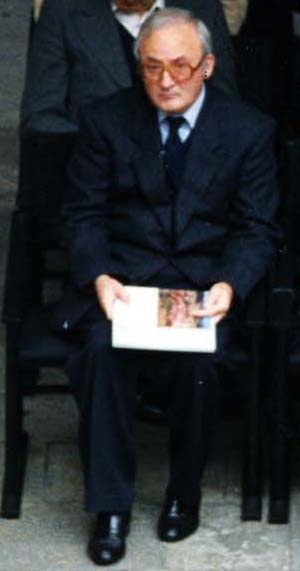Juan María Lekuona facts for kids
Juan María Lekuona Berasategi (born in Oiartzun, Guipúzcoa, in 1927 – died in Donostia, on December 5, 2005) was a famous Basque poet. He wrote his poems in euskera, the Basque language.
Juan María was the nephew of Manuel Lekuona, another important Basque figure. In 1953, he became a priest. He studied in Rome, where he completed his thesis. After his studies, he worked in Añorga, a town near Donostia. Early in his career, he was inspired by the writer Gabriel Aresti. This led his first works, like his book Mindura gaur, to focus on social issues.
He was also the first president of EIZIE (the Association of Translators, Correctors, and Interpreters of Basque) in 1987. His research into bertsolarism, which is an oral Basque poetry tradition, was very important. He became a member of Euskaltzaindia (the Royal Academy of the Basque Language) in 1988. Juan María Lekuona won several awards, including two Premios Euskadi de Literatura (Basque Literature Prizes) in 1979 and 1990.
Early Life and Studies
Juan María Lekuona studied theology and held his first Mass in Oiartzun in 1953. That same year, he went to Rome to study Spiritual Theology. There, he wrote his thesis about the ideas of Fray Bartolomé de los Mártires. While in Rome, he also wrote his first poem in Basque, called "Mindura gaur" (Today Mindura).
From a young age, Juan Mari Lekuona loved literature and writing. He chose to write in Basque because Basque culture was facing challenges. He wanted to help and serve his language and community through his writing. He was one of the first young poets of his time, along with Orixe, Lauaxeta, and Lizardi.
After not writing for eleven years, Lekuona started a new phase in his poetry. He discovered poets like Gabriel Aresti, whose work influenced him greatly. This led him to write more about social topics and life's big questions.
Writing Career
In his early writing years, Juan María Lekuona contributed to several magazines. These included "Zeruko Argia," "Olerti," "Egan," and "El Bidasoa." In 1968, he published his doctoral thesis. However, his biggest impact was in the world of poetry.
His first poetry book, "Mindura gaur," came out in 1966. Later, in 1972, he included it in a collection called "Muga beroak" (Hot Borders), along with two other books. In 1981, he received the Spanish Poetry Prize.
Lekuona's poems often explored deep questions about life and people. He mixed modern ideas with the traditional style of bertsolaritza, which is a type of improvised Basque oral poetry. His poetry grew and became deeper over the years, marking important moments in Basque literature. One of his most famous poems is "Errota Zahar" (The Old Mill). He also wrote articles about oral literature.
From 1987, he was a full member of Euskaltzaindia, the Royal Academy of the Basque Language. He served as its president from 1989 to 1995. He also led the Literature Committee there. Additionally, he was the president of EIZIE from 1987 to 1990.
See also
 In Spanish: Juan María Lekuona para niños
In Spanish: Juan María Lekuona para niños
 | Frances Mary Albrier |
 | Whitney Young |
 | Muhammad Ali |


